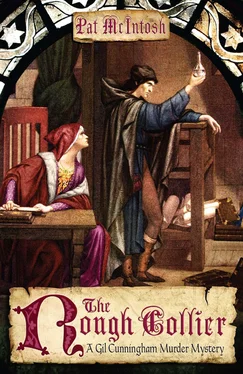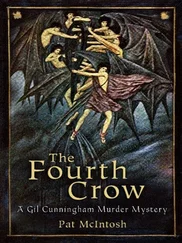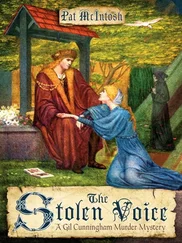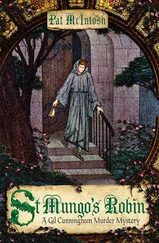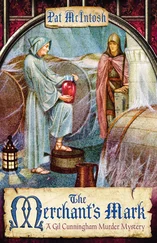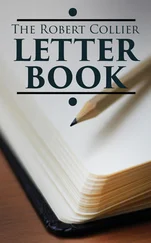Pat McIntosh - The Rough Collier
Здесь есть возможность читать онлайн «Pat McIntosh - The Rough Collier» весь текст электронной книги совершенно бесплатно (целиком полную версию без сокращений). В некоторых случаях можно слушать аудио, скачать через торрент в формате fb2 и присутствует краткое содержание. Жанр: Исторический детектив, на английском языке. Описание произведения, (предисловие) а так же отзывы посетителей доступны на портале библиотеки ЛибКат.
- Название:The Rough Collier
- Автор:
- Жанр:
- Год:неизвестен
- ISBN:нет данных
- Рейтинг книги:4 / 5. Голосов: 1
-
Избранное:Добавить в избранное
- Отзывы:
-
Ваша оценка:
- 80
- 1
- 2
- 3
- 4
- 5
The Rough Collier: краткое содержание, описание и аннотация
Предлагаем к чтению аннотацию, описание, краткое содержание или предисловие (зависит от того, что написал сам автор книги «The Rough Collier»). Если вы не нашли необходимую информацию о книге — напишите в комментариях, мы постараемся отыскать её.
The Rough Collier — читать онлайн бесплатно полную книгу (весь текст) целиком
Ниже представлен текст книги, разбитый по страницам. Система сохранения места последней прочитанной страницы, позволяет с удобством читать онлайн бесплатно книгу «The Rough Collier», без необходимости каждый раз заново искать на чём Вы остановились. Поставьте закладку, и сможете в любой момент перейти на страницу, на которой закончили чтение.
Интервал:
Закладка:
‘Fleming!’ said Michael as they moved on. ‘He’s still in a rage this morning. It’s not like the man. He’s aye full of orders and directions to his inferiors, but in general he crawls like a spaniel with the family — wi’ my father and brothers and me — and there he was, frothing like a mad dog because his porridge was over-salted, shouting at me and all.’
‘Strange,’ said Gil, almost at random. ‘I wonder if the beating shook something loose in his head?’
‘Seems like it. I hope Mistress Lithgo can help.’
‘Are we on the right track here?’ Gil asked. He halted again, and waved at the Cauldhope men to stand where they were. ‘Bide here,’ he said, giving in to his rising sense of unease. ‘Let me go ahead. There’s too many of us for stealth.’
‘You think we need to creep up on him?’ Michael turned back to look at him. ‘Wi’ the linn roaring like that? And no birds to startle?’
That was the missing thing, he acknowledged. There was no birdsong, no flitting wings from tree to tree as one would expect in woodland at this time of year, only the distant crows. He had smelled a fox trail, noted badger droppings, seen more rabbit-holes, so the four-legged creatures were about as well as the insects, but there were no birds where there should be birds in plenty.
‘I’m not happy,’ he said. ‘Something’s not right. Bide here, all of you. I’ll bark like a dog fox, twice, if I want to call you forward, and come softly.’
Working his way quietly up the hollow on his own, moving from thicket to thicket, senses alert, he turned over Michael’s information in his head. If neither Murray nor his drinking-companion had been seen for five weeks, where were they? What would take two young men, one of them wedded to a lovely girl like Joanna, out of their habitual paths for that length of time?
The little valley climbed round to the right. The rumble of the great waterfall was less overwhelming here, but there was still no birdsong in the dappled shade. He paused under an ash tree whose sooty buds were just breaking into green feathers, drew a deep breath, and extended his senses in the way Billy Meikle his father’s huntsman had taught him. The place was quiet and still; the crows argued in the distance, the little burn gurgled, the tops of the trees stirred. Scents on the air told him of damp earth and growing things, of the fox again, of the different trees around him. There was an elder tree somewhere, its rank odour unmistakable, and a yew among the hawthorn blossom. The fox had hidden a kill somewhere and forgotten it; he could smell carrion. There was no smell of smoke, or of a human habitation.
Up the valley, something rustled. Unmoving, he stared towards the sound, muscles taut as bowstrings, ears stretched. Another rustle, and the bushes stirred: it sounded like a large creature. Then a branch was pushed aside, a horned head peered out of a thicket, yellow slotted eyes studied him disdainfully. A goat.
It stepped delicately out of the bushes, and another one followed, then a third with a kid at its heels. They inspected him, decided unanimously he was of no use, the first one bleated eloquently and they all turned and made their way up the side of the hollow. He watched them go, and then moved on with caution, thinking hard.
The valley bent again, to the left, and opened out a little. Rounding the curve, he stopped to assess the ground again, and after a moment made out the cottage. It was not in the open by the burn but set back and up a little under the trees, clinging to the slope, the usual low structure of drystone and wattle-and-daub, its thatch of bracken and heather sagging on the beams, its door ajar. Nothing moved. He could smell old peat fires, the midden, the goats, but no smoke rose through the thatch. As he watched, the goats themselves reappeared, tittuped in single file down the valley side and up the other, paused to stare superciliously at him and processed into the house. Behind the door, something scurried.
Another whiff of carrion reached him.
He braced himself, and moved forward carefully, alert for any sign he could read. He did not seem to be on the approach the forester used to his cottage; there had been no trodden way up the little valley, no sign of regular passage, and the track the goats had just followed, down from his right, was broader than their little cloven hooves required and must be the usual access. The yew tree stood beside it, a dark ominous shape in the sunlight.
He crossed the burn where it spread out gurgling into a shallow ford, and stepped on to a cobbled path which led up to the house door. More than one patch of hen-feathers on the stones spoke of the fox’s depredations, and the carrion smell was stronger here.
The forester’s gear stood around. A handcart, tilted on to its handles, with a rusting pruning-hook leaning across the flat bed. On the ground beside it a ladder and a tangle of hemp rope, a leather helmet, and a long canvas holdall, damp and red-stained. Gil moved cautiously over to look at it. The stains on the bag were dark, rust-red, smelled like rust. He unfastened the buckle and gingerly drew open the mouth of the bag, to find a set of knives and saws, the handles polished by use, the blades patched and pitted and spoiling. One of the saws had fragments of bark caught in its teeth. Andro Syme’s tools, lying out in the rain where he had dropped them when he came back from the day’s work.
He straightened up, trying to visualize the scene. The forester would have come up the cobbled way from the burn, perhaps manhandling his cart. Or had he gone out without cart and ladder that day? He had reached this point, and something had caused him to drop everything he held and …
And what? What had made him leave his tools and prevented him returning to them? Was it fear, surprise, joy? Had he run to meet someone, run to fetch a weapon? Not a weapon, Gil thought, looking down at the rusting blades at his feet. The man had weapons enough to hand. So not fear, then, but surprise: something or someone he had not expected to see. Or perhaps something to do with the goats — the birth of the kid he had seen, or another such crisis. But why had he left his trade here ever since, to be ruined by the rain?
Gil turned and stepped reluctantly up to the house door. Rustling and scurrying sounds greeted him, not all of them due to the goats. There was a tirling-pin set on the wooden jamb. He rattled the ring up and down its twisted iron bar, and said, ‘Is anyone at home?’
More sharp scuttlings. Inside the house, one of the goats bleated.
There was a loud, inhuman screech, horrifyingly close. He caught at the door-frame for support as something white sailed over the house roof and down, passed within a handspan of his head and soared up into the trees across the burn.
Heart still hammering, whinger in hand, he swung round to watch it as it furled pale wings, hiding the white inner coverts, and became a familiar gold-brown shape. Round eyes blinked from a shadowed hollow in the branches of the yew tree.
A screech-owl, by daylight.
The smell of carrion was stronger than ever. He waited a moment longer while his heart steadied, then pushed the door wider and stepped into the dark interior of the cottage.
When Michael and his men appeared in answer to the signal, Gil was sitting on the bench by the house door, beads in hand, watching the goats stripping the leaves on a young beech. He looked up as they rounded the turn of the valley, and Michael’s first words died on his lips.
‘What is it, man?’ he said, staring. ‘You look as if you’d been to Hell and back.’
‘Near enough,’ said Gil. He rose and stowed his beads in his purse, and the newcomers splashed across the ford, the men exclaiming in disgust as the smell reached them. ‘It’s not a bonnie sight. The most of you can wait outside, but I want someone to study it along wi’ me, in case I miss sign that might tell us what happened, for it’s not very clear. Whoever he is he’ll need a strong stomach.’
Читать дальшеИнтервал:
Закладка:
Похожие книги на «The Rough Collier»
Представляем Вашему вниманию похожие книги на «The Rough Collier» списком для выбора. Мы отобрали схожую по названию и смыслу литературу в надежде предоставить читателям больше вариантов отыскать новые, интересные, ещё непрочитанные произведения.
Обсуждение, отзывы о книге «The Rough Collier» и просто собственные мнения читателей. Оставьте ваши комментарии, напишите, что Вы думаете о произведении, его смысле или главных героях. Укажите что конкретно понравилось, а что нет, и почему Вы так считаете.
